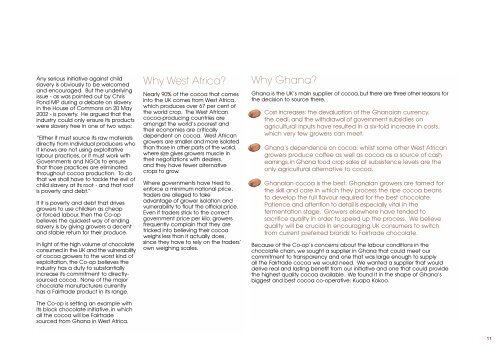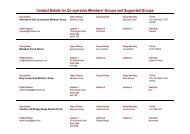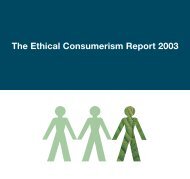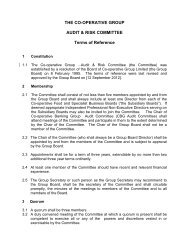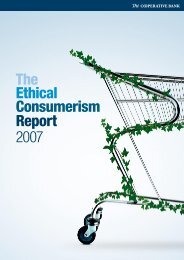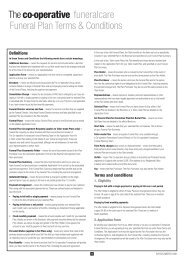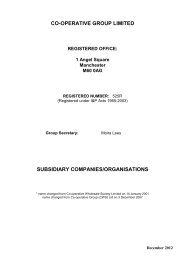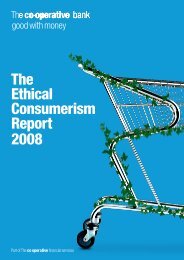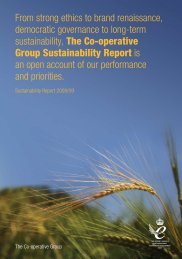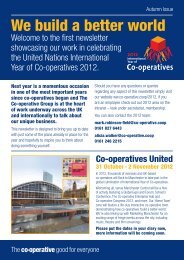Chocolate Report PDF - Fair Trade Barrie
Chocolate Report PDF - Fair Trade Barrie
Chocolate Report PDF - Fair Trade Barrie
Create successful ePaper yourself
Turn your PDF publications into a flip-book with our unique Google optimized e-Paper software.
Any serious initiative against child<br />
slavery is obviously to be welcomed<br />
and encouraged. But the underlying<br />
issue - as was pointed out by Chris<br />
Pond MP during a debate on slavery<br />
in the House of Commons on 20 May<br />
2002 - is poverty. He argued that the<br />
industry could only ensure its products<br />
were slavery free in one of two ways:<br />
“Either it must source its raw materials<br />
directly from individual producers who<br />
it knows are not using exploitative<br />
labour practices, or it must work with<br />
Governments and NGOs to ensure<br />
that those practices are eliminated<br />
throughout cocoa production. To do<br />
that we shall have to tackle the evil of<br />
child slavery at its root - and that root<br />
is poverty and debt.”<br />
If it is poverty and debt that drives<br />
growers to use children as cheap<br />
or forced labour, then the Co-op<br />
believes the quickest way of ending<br />
slavery is by giving growers a decent<br />
and stable return for their produce.<br />
In light of the high volume of chocolate<br />
consumed in the UK and the vulnerability<br />
of cocoa growers to the worst kind of<br />
exploitation, the Co-op believes the<br />
industry has a duty to substantially<br />
increase its commitment to directlysourced<br />
cocoa. None of the major<br />
chocolate manufacturers currently<br />
has a <strong>Fair</strong>trade product in its range.<br />
The Co-op is setting an example with<br />
its block chocolate initiative, in which<br />
all the cocoa will be <strong>Fair</strong>trade<br />
sourced from Ghana in West Africa.<br />
Why West Africa?<br />
Nearly 90% of the cocoa that comes<br />
into the UK comes from West Africa,<br />
which produces over 67 per cent of<br />
the world crop. The West African<br />
cocoa-producing countries are<br />
amongst the world’s poorest and<br />
their economies are critically<br />
dependent on cocoa. West African<br />
growers are smaller and more isolated<br />
than those in other parts of the world,<br />
where size gives growers muscle in<br />
their negotiations with dealers,<br />
and they have fewer alternative<br />
crops to grow.<br />
Where governments have tried to<br />
enforce a minimum national price,<br />
traders are alleged to take<br />
advantage of grower isolation and<br />
vulnerability to flout the official price.<br />
Even if traders stick to the correct<br />
government price per kilo, growers<br />
frequently complain that they are<br />
tricked into believing their cocoa<br />
weighs less than it actually does,<br />
since they have to rely on the traders’<br />
own weighing scales.<br />
Why Ghana?<br />
Ghana is the UK’s main supplier of cocoa, but there are three other reasons for<br />
the decision to source there.<br />
Cost increases: the devaluation of the Ghanaian currency,<br />
the cedi, and the withdrawal of government subsidies on<br />
agricultural inputs have resulted in a six-fold increase in costs,<br />
which very few growers can meet.<br />
Ghana’s dependence on cocoa: whilst some other West African<br />
growers produce coffee as well as cocoa as a source of cash<br />
earnings, in Ghana food crop sales at subsistence levels are the<br />
only agricultural alternative to cocoa.<br />
Ghanaian cocoa is the best: Ghanaian growers are famed for<br />
the skill and care in which they process the ripe cocoa beans<br />
to develop the full flavour required for the best chocolate.<br />
Patience and attention to detail is especially vital in the<br />
fermentation stage. Growers elsewhere have tended to<br />
sacrifice quality in order to speed up the process. We believe<br />
quality will be crucial in encouraging UK consumers to switch<br />
from current preferred brands to <strong>Fair</strong>trade chocolate.<br />
Because of the Co-op’s concerns about the labour conditions in the<br />
chocolate chain, we sought a supplier in Ghana that could meet our<br />
commitment to transparency and one that was large enough to supply<br />
all the <strong>Fair</strong>trade cocoa we would need. We wanted a supplier that would<br />
derive real and lasting benefit from our initiative and one that could provide<br />
the highest quality cocoa available. We found it in the shape of Ghana’s<br />
biggest and best cocoa co-operative: Kuapa Kokoo.<br />
11


